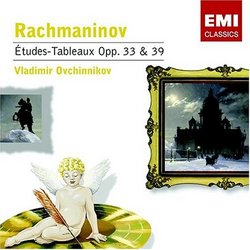| All Artists: Vladimir Ovchinnikov, Sergei Rachmaninov Title: Rachmaninov: Etudes-Tableaux, Op. 33 & 39; Vladimir Ovchinnikov Members Wishing: 0 Total Copies: 0 Label: EMI Classics Release Date: 7/13/2004 Genre: Classical Styles: Chamber Music, Historical Periods, Classical (c.1770-1830) Number of Discs: 1 SwapaCD Credits: 1 UPC: 724358581720 |
Search - Vladimir Ovchinnikov, Sergei Rachmaninov :: Rachmaninov: Etudes-Tableaux, Op. 33 & 39; Vladimir Ovchinnikov
 | Vladimir Ovchinnikov, Sergei Rachmaninov Rachmaninov: Etudes-Tableaux, Op. 33 & 39; Vladimir Ovchinnikov Genre: Classical
|
Larger Image |
CD Details |
CD ReviewsEssential Rachmaninov - Electrifying Performance Hexameron | 04/27/2007 (5 out of 5 stars) "The aficionados and Rachmaninov completists out there might invariably recommend recordings of the Etudes-Tableaux from their presupposed "best of the best": either obscure recordings featuring the Golden Age pianists or newer and expensive recordings from the likes of the DG label. I'm actually surprised no one has yet reviewed this recording and made the usual list that we should all go for: Horowitz, Ashkenazy, or Richter. Of course their recordings are invaluable to the Rachmaninov discography, but this bargain-priced release from the EMI label is equally special. Not only is it an incredible budget deal, but Vladimir Ovchinnikov's performances are of surprisingly high caliber. While Ovchinnikov won't convert the Horowitz or Richter cohort, he has certainly swayed me away from liking Ashkenazy and even Biret of Naxos, another reputable budget label. For those intrepid explorers who are curious to sample Rachmaninov's finest solo piano works, EMI offers a stellar recording of what is really an essential introduction to the Russian master. The Etudes-Tableax were written in a time when Stravinsky's Rite of Spring was changing art and Scriabin's mystical tonality was taking hold in Russian piano music. And yet Rachmaninov still has much to say after the rich Chopin-Liszt-Henselt aesthetic of the Romantic period. As far as the field of Etudes, Rachmaninov displays wonderful originality and musical profundity. In both sets, the Op. 33 and 39, Rachmaninov seems influenced by Mussorgsky's "Pictures at an Exhibition" while also employing his own idiomatic style of extraordinary lyricism and colossal virtuosity. Unlike Mussorgsky, Rachmaninov does not inform the listener as to the pictorial inspiration for each piece, but he did divulge to Respighi some possible programmes: the sea and seagulls, Little Red Riding Hood, scenes at a Fair, and a funeral march, to name a few. On the whole, Vladimir Ovchinnikov demonstrates a satisfying consistency in his executions of these Etudes. I might be able to bicker over a few of these, arguing that Richter is better in one virtuosic passage, or Berezovsky brings more drama to another, but I really don't think that's necessary. Ovchinnikov's legato, evenness of tone, and technical flawlessness is the standard by which these works should be played. But he goes beyond mere acrobatics with his sensuous dynamics, careful tempo and explosive crescendi, efficiently evoking the temperament of each piece. Of the Op. 33, Ovchinnikov reveals the depths of his musicality and the power of his passion in No. 3 and 9, both marked "Grave." These dark, chordal textured works reach marvelous levels of melancholy and turmoil in Ovchinnikov's hands. And in No. 5 and No. 8, both marked Moderato, this performer showcases a combination of exquisite brilliance and gentle lyricism. Considered the most representative of Rachmaninov's Etudes, the Op. 39 are also interpreted and executed with striking excellence. No. 2 in particular, the sublime mini-Isle of the Dead piece that echoes a four-note motif from the Dies Irae, is a profound and spellbinding work. Again, Ovchinnikov is superlative in his rendition of each phrase, creating an atmosphere of haunting repose and beautiful reflections. Returning with grandiose Romanticism and awesome power, Ovchinnikov joins the top-tier of pianists with his performances of No. 3 and 5. I personally appreciate his legato phrasing in the opening theme of No. 3. Usually, most pianists play that opening chord of the theme with an overly detached sound; it wasn't until Berezovsky that I realized the effect is far better with an over-pedaling of this piece. Ovchinnikov seems to concur and plays it exceedingly well, generating a far more sonorous result than is normally heard. Bottom line: For Rachmaninov fanatics who are used to their beloved interpretations by Horowitz or Richter, this recording probably won't change your preferences in favor of Ovchinnikov. But for those who have an interest in hearing other pianists tackle these great miniatures, know that Ovchinnikov is a superior pianist and is worth investigating. Ultimately, though, this budget label recording is for those who have yet to hear these little masterpieces. At a price of $6.98, this, along with Amadis's Rachmaninov: Piano Works for $2.99 is the best deal you can find." You can't miss it! Fabbri Michele | Italy | 01/03/2007 (5 out of 5 stars) "Really an extraordinary CD; if you're fond of Rachmaninov you MUST have it (and the price is really incredible...)!"
|

 Track Listings (17) - Disc #1
Track Listings (17) - Disc #1